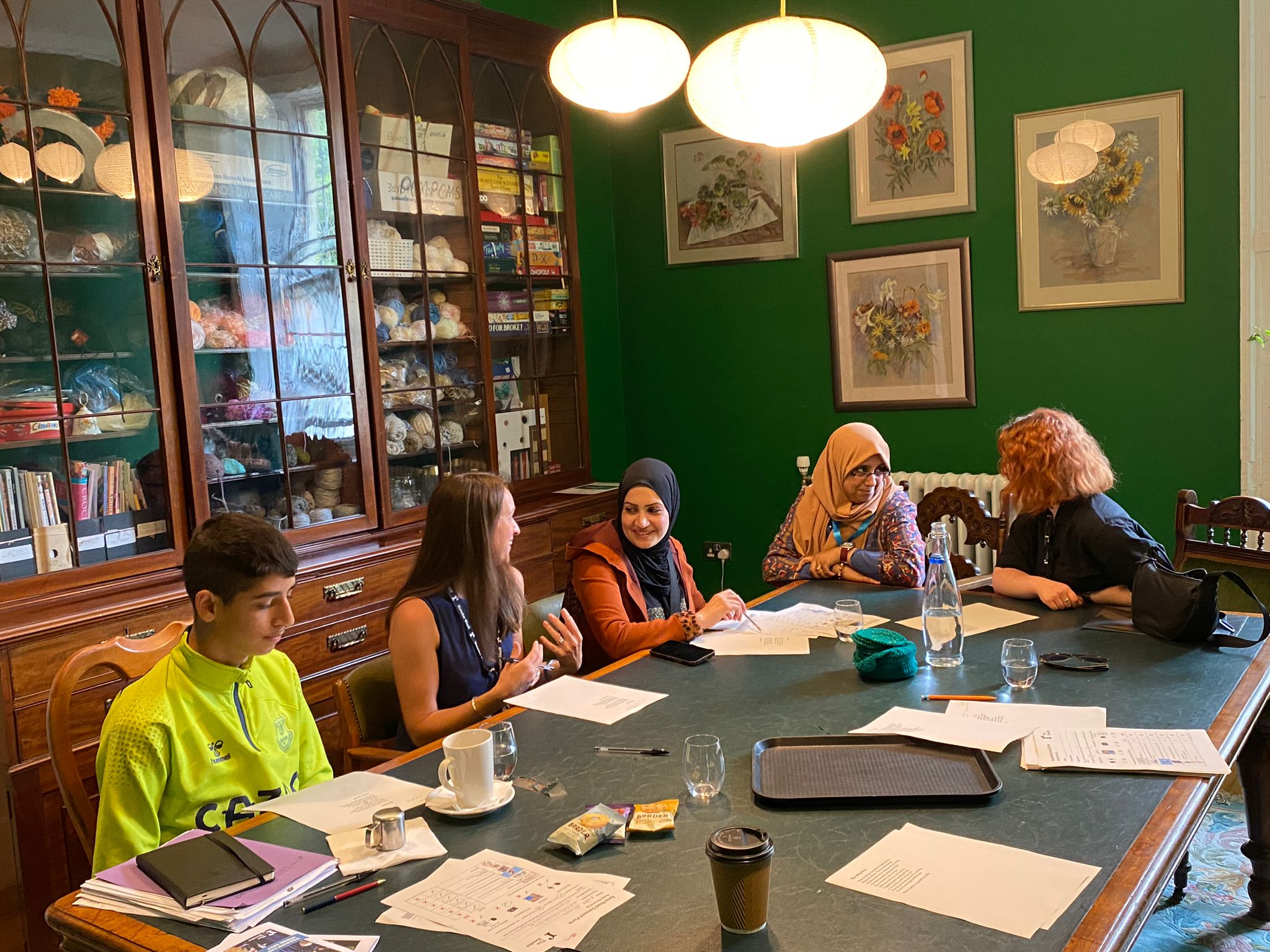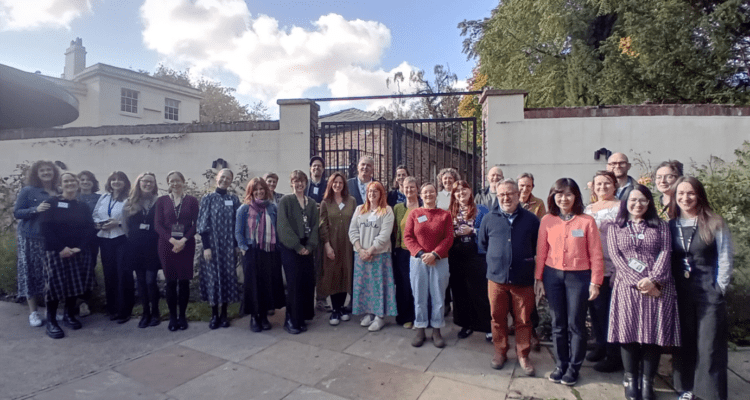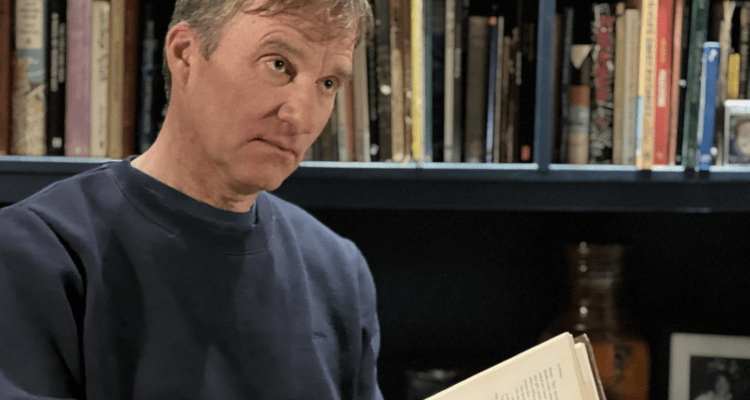Shared Dreams: The Shared Reading Group for Parents Seeking Asylum
Two years ago a new Shared Reading group was set up for families seeking asylum whose children attend the council’s Our Liverpool stop-gap school hosted at The Reader’s home in Calderstones Park. Katie Clark, The Reader’s Director of Literature, who founded the group, and co-lead Mary Crotty reflect on its impact...

Native Kurdish speaker Arazu was a regular member of a weekly Shared Reading group for families seeking asylum run by national charity The Reader for six months.
The ESOL (English for Speakers of Other Languages) adult Shared Reading group was set up in 2022 to coincide with Liverpool City Council’s Our Liverpool ‘s stop-gap school for children at The Reader’s home in Calderstones Park, Liverpool.
Our Liverpool, run by Liverpool City Council, offers a range of support for vulnerable migrants, people seeking asylum and those with refugee status across the city.
And although Arazu did not speak any English, the use of Google Translate on mobile phones is actively encouraged in ESOL groups to help combat the language barrier.
The group’s co-leader Mary Crotty recalls: “Arazu was always smiling and happy, and although she couldn’t speak English, she explained how much she loved cooking for her family.
“One day we were reading a poem about food, which is always a good talking or reference point as it leads to people discussing their native dishes and favourite foods.
“Aruzu told us via Google Translate about Dolma, a traditional dish in her country, typically made with a filling of rice and minced meat, inside a vegetable or a leaf wrapping. We were saying we’d never heard of it before.
“The following week, before our Shared Reading group, we went to meet our regular members in the Reader Cafe when Arazu arrived by taxi with a huge steaming hot pot of freshly made Dolma to share with us.
“We all sat round a table tasting this dish at 9.30am! You could see how happy this made her. It was a lovely moment. Even though I’m vegetarian I ate it as did not want her to think I did not appreciate her cooking!”
The Reader’s Director of Literature Katie Clark hoped the Shared Reading group would help to build a sense of community, provide consistency and stability in the often-disruptive lives of people who are refugees and asylum seekers while their children attended the school.
She felt it was also an opportunity to support the wellbeing of individuals and for participants to build friendships.
At any one time this Shared Reading group can be made up of a rich and diverse mix of languages – Albanian, Arabic, Kurdish, Urdu, Persian, Greek, Spanish and more.
Katie said: “Before setting up the group I talked to a friend of mine who works in this area. She said Google Translate is essential. This is the big difference to other Shared Reading groups, letting people know it's okay to use their phones and it will help them to communicate and understand the stories and poems we read.
“To begin we will often just go, sit and chat with parents in the Welcome area or cafe while they wait for their children who attend Our Liverpool’s school at Calderstones. The council provides transport, a hot drink and toast for them.
“Groups are always very relaxed and there is no pressure to read aloud. Sometimes we help with form filling, other times we have run the group with just one person or for up to seven or eight parents, including babies, prams and young children playing under the table. We like people to talk about the things they love.
“A group dynamic can change suddenly as often families are only here for a very short time while waiting for their cases to be reviewed and can be moved on quite quickly. So, many people do not get to say goodbye to us, and that is sad.
“Our groups are very interactive and playful. We act things out and point to paintings in the room or plants and trees outside to describe what we are talking about.
“We will even attempt to try and read a poem in another person’s language much to their amusement.”
Mary added: “We now have many tried and tested ESOL resources available from some of The Reader’s more established ESOL Shared Reading groups across the UK, so we know which literature works well to read aloud in this setting.”
Cultural sensitivity and empathy are key components for those who lead ESOL Shared Reading groups.
Katie said: “We do not know what circumstances people have escaped from, if they have been on a traumatic journey or what difficulties they are facing now.
“One lady from Kosovo really wanted us to meet her son on a video call. He had stayed behind in her country. They explained how it had been a difficult decision to split up the family. She was very emotional afterwards.
“At our first Christmas party we laid out all these blankets and cushions on the floor in our Quiet Room. One lady who did not speak much English arrived with her friend, carrying a small baby.
“This lady was very nervous and looked completely exhausted. She just lay down on the blankets while her baby slept and fell asleep. It is nice she felt comfortable doing that.
“A young boy who came to the group for a time told us about his experience of arriving to the UK on a boat – it was a horrific experience, yet he spoke of it in such a matter-of-fact way.
“A man from India told us how he had suffered persecution and violence in his country. He was deeply upset and said: ‘I miss my home, but I can’t be there as it’s not safe for me’.
“It’s so important people feel safe and supported here.
“I’d love to say in the future we have groups for asylum seekers and refugees in all major UK cities.”
- The ‘Our Liverpool’ group is currently one of 15 ESOL Shared Reading groups, whose participants include refugees and people seeking asylum, run by The Reader across the UK.
- Three well-established groups meet in libraries in Liverpool, Bristol and Greater London. Another group meets at a women’s centre in Birmingham, while one meets weekly online, another is held at a centre for adults over 50 and there is a large ESOL group in the Lancashire town of Skelmersdale.
- Two new groups, funded by Halton Borough Council, are also set to launch in Runcorn and Widnes later this year to offer support to asylum seekers and refugees, including an open-community group to help bridge community connections.
Share
Related Articles

Celebrating the first ever International Shared Reading Conference
‘It has been a wonderful day - great meeting you all! Loved the Shared reading and getting new knowledge. Inspiring…

Meet The Reader: Staff Spotlight with Michael Prior
Michael Prior is our Partnerships Lead at The Reader. After increased demand in libraries and care homes for Shared Reading,…

9 things I’ve learnt from Shared Reading in the UK’s most secure prisons
As our Criminal Justice People and Project Manager, Kate Bramhall, moves onto pastures new she reflects on her time at…


